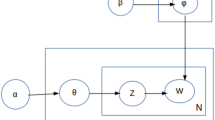Abstract
Social media has demonstrated to be a strong medium that makes a durable effect on the manner in which individuals communicate and has now turned into a fundamental piece of their lives. Especially with the COVID-19 pandemic, people have taken to social media to voice their thoughts and views on various topics. Twitter ranks highest amongst all the social media platforms, when one wants to exchange ideas and information or express their opinions in the form of text. Hence, tweets are often the most useful in generating a vast amount of data in text source, and hence, it is preferred as a text analytics platform. Text analytics is used for gaining deeper insights from a piece of unstructured text. Specifically, for tweets, it has various applications such as identifying patterns and trends or understanding the thought process of the users. This has resulted in techniques such as sentiment analysis, opinion mining, argument mining, stance detection, and many more. This survey paper discusses the various text analytics methods on tweets with a focused literature survey on sentiment analysis, opinion mining, argument mining, and stance detection.
Access this chapter
Tax calculation will be finalised at checkout
Purchases are for personal use only
Similar content being viewed by others
References
Kitchenham, B. and Charters, S., 2007. Guidelines for performing systematic literature reviews in software engineering.
Miner, G., Elder IV, J., Fast, A., Hill, T., Nisbet, R. and Delen, D., 2012. Practical text mining and statistical analysis for non-structured text data applications. Academic Press.
Wagh, R. and Punde, P., 2018, March. Survey on sentiment analysis using Twitter dataset. In 2018 Second International Conference on Electronics, Communication and Aerospace Technology (ICECA) (pp. 208–211). IEEE.
Medhat, W., Hassan, A. and Korashy, H., 2014. Sentiment analysis algorithms and applications: A survey. Ain Shams Engineering Journal, 5(4), pp.1093–1113.
Yun, Y., Hooshyar, D., Jo, J. and Lim, H., 2018. Developing a hybrid collaborative filtering recommendation system with opinion mining on purchase review. Journal of Information Science, 44(3), pp.331–344.
Liu, B., 2012. Sentiment analysis and opinion mining. Synthesis lectures on human language technologies, 5(1), pp.1–167.
Liu, B., 2011. Web data mining: exploring hyperlinks, contents, and usage data (Vol. 1). Berlin: Springer.
Jindal, N. and Liu, B., 2006, July. Mining comparative sentences and relations. In AAAI (Vol. 22, No. 13311336, p. 9).
Zhang, L. and Liu, B., 2011, June. Identifying noun product features that imply opinions. In Proceedings of the 49th Annual Meeting of the Association for Computational Linguistics: Human Language Technologies (pp. 575–580).
Bosc, T., Cabrio, E. and Villata, S., 2016, May. DART: A dataset of arguments and their relations on Twitter. In Proceedings of the 10th Edition of the Language Resources and Evaluation Conference (pp. 1258–1263).
Schaefer, R. and Stede, M., 2020, December. Annotation and detection of arguments in tweets. In Proceedings of the 7th Workshop on Argument Mining (pp. 53–58).
Clos, J., Wiratunga, N., Massie, S. and Cabanac, G., 2016. Shallow techniques for argument mining.
Biber, D. and Finegan, E., 1988. Adverbial stance types in English. Discourse processes, 11(1), pp.1–34.
ALDayel, A. and Magdy, W., 2021. Stance detection on social media: State of the art and trends. Information Processing & Management, 58(4), p.102597.
Walker, M., Anand, P., Abbott, R. and Grant, R., 2012, June. Stance classification using dialogic properties of persuasion. In Proceedings of the 2012 Conference of the North American Chapter of the Association for Computational Linguistics: Human Language Technologies (pp. 592–596).
Zhang, S., Qiu, L., Chen, F., Zhang, W., Yu, Y. and Elhadad, N., 2017, April. We make choices we think are going to save us: Debate and stance identification for online breast cancer CAM discussions. In Proceedings of the 26th International Conference on World Wide Web Companion (pp. 1073–1081).
Konjengbam, A., Ghosh, S., Kumar, N. and Singh, M., 2018, September. Debate stance classification using word embeddings. In International Conference on Big Data Analytics and Knowledge Discovery (pp. 382–395). Springer, Cham.
Hasan, K.S. and Ng, V., 2013, October. Stance classification of ideological debates: Data, models, features, and constraints. In Proceedings of the Sixth International Joint Conference on Natural Language Processing (pp. 1348–1356).
Küçük, D. and Can, F., 2020. Stance detection: A survey. ACM Computing Surveys (CSUR), 53(1), pp.1–37.
Trabelsi, A. and Zaiane, O., 2018, June. Unsupervised model for topic viewpoint discovery in online debates leveraging author interactions. In Proceedings of the International AAAI Conference on Web and Social Media (Vol. 12, No. 1).
Darwish, K., Stefanov, P., Aupetit, M. and Nakov, P., 2020, May. Unsupervised user stance detection on Twitter. In Proceedings of the International AAAI Conference on Web and Social Media (Vol. 14, pp. 141–152).
A. Joshi, P. Bhattacharyya, M. Carman, Political issue extraction model: A novel hierarchical topic model that uses tweets by political and non-political authors, in: Proceedings of the 7th Workshop on Computational Approaches to Subjectivity, Sentiment and Social Media Analysis, 2016, pp. 82–90.
R. Ammar, K. Mucahid, D. Kareem, E. Tamer, B. Cansin, Embeddings based clustering for target specific stances: The case of a polarized Turkey, ICWSM2021 (2021).
https://s3-eu-west-1.amazonaws.com/downloads.gate.ac.uk/pheme/semeval2017-task8-dataset.tar.bz2
https://github.com/mirkolai/Stance-Evolution-and-Twitter-Interactions
https://github.com/eceveco/COVID-CQ/blob/master/COVID-CQ.csv
Author information
Authors and Affiliations
Corresponding author
Editor information
Editors and Affiliations
Rights and permissions
Copyright information
© 2023 The Author(s), under exclusive license to Springer Nature Switzerland AG
About this paper
Cite this paper
Bansod, U., Nath, D., Agrawal, C., Yadav, S., Dalvi, A., Kazi, F. (2023). A Survey Paper on Text Analytics Methods for Classifying Tweets. In: Misra, R., et al. Advances in Data Science and Artificial Intelligence. ICDSAI 2022. Springer Proceedings in Mathematics & Statistics, vol 403. Springer, Cham. https://doi.org/10.1007/978-3-031-16178-0_22
Download citation
DOI: https://doi.org/10.1007/978-3-031-16178-0_22
Published:
Publisher Name: Springer, Cham
Print ISBN: 978-3-031-16177-3
Online ISBN: 978-3-031-16178-0
eBook Packages: Mathematics and StatisticsMathematics and Statistics (R0)




